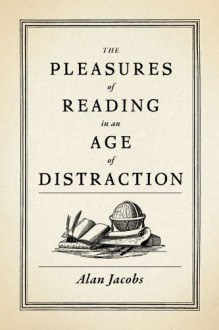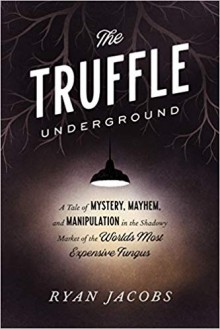

Read would give you delight—at least most of the time—and do so without shame. And even if you are that rare sort of person who is delighted chiefly by what some people call Great Books, don't make them your study intellectual diet, any more than eat at the most elegant of restaurants every day. It would be too much. Great books are great in part because of what they ask of their readers: they are not readily encountered, easily accessed. The poet W. H. Auden once wrote, "When one thinks of the attention that a great poem demands, there's something frivolous about the notion of spending every day with one. Masterpieces should be kept for High Holidays of the Spirit"—for our own personal Christmases and Easters, not for any old Wednesday.
I picked this up as my first book of the year as a way to refresh the mind, come into the year with a reminder of what kind of reader I want to be. As I write this, I'm deliberately not looking at what I wrote last time I read this, but you may find it interesting. Maybe not. I don't know if I'll end up repeating myself.
I remember this book being as close to a mission statement for my approach to reading as you could hope for—particularly because I came to it late in life. It's not like this is a book I read in college and it shaped me/my thinking, but it's something that I came to a couple of years ago and it was as if a more erudite and thoughtful version of myself had written it.
The beginning of the book is the heart of it, he sets forth his central theses, core argument:
one dominant, overarching, nearly definitive principle for reading: Read at Whim.
Reading shouldn't be about self-improvement (primarily), it isn't the mental equivalent of eating Brussels Sprouts. It should be for pleasure. And to maximize that, Jacobs will argue—read at whim.
Following that, Jacobs talks about many aspects of reading for pleasure—note-taking, thinking about what we read, focus (and how to expand it), the role of ereaders (he's surprisingly pro-ereader), fighting distractions, evaluating what we read and more.
I was particularly struck this time through by his section on re-reading. For growing in appreciation for, or understanding of a work. Or because you enjoy escaping into a well-known and beloved world for a period.
Jacobs frequently quotes Auden, at one point he cites Auden's five ratings for a book—I think we should maybe replace the standard 5-Star system with this:
For an adult reader, the possible verdicts are five: I can see this is good and I like it; I can see this is good but I don't like it; I can see this is good, and, though at present I don't like it, I believe with perseverance I should come to like it; I can see that this is trash but I like it; I can see that this is trash and I don't like it.
Most of all, this is a celebration of/appreciation of reading. Jacobs is a kindred spirit to us readers as well as a humanities professor. Reading is both a passion and a profession—and both (particularly the former) are clearly seen in these pages.
Our goal as adults is not to love all books alike, or as few as possible, but rather to love as widely and as well as our limited selves will allow.
Hear, hear. That's a good reminder.

TITLE: The Truffle Underground: A Tale of Mystery, Mayhem, and Manipulation in the Shadowy Market of the World's Most Expensive Fungus
AUTHOR: Ryan Jacobs
DATE PUBLISHED: 2019
FORMAT: Paperback
ISBN-13: 9780451495693
_______________
DESCRIPTION:
"Beneath the gloss of star chefs and crystal-laden tables, the truffle supply chain is touched by theft, secrecy, sabotage, and fraud. Farmers patrol their fields with rifles and fear losing trade secrets to spies. Hunters plant poisoned meatballs to eliminate rival truffle-hunting dogs. Naive buyers and even knowledgeable experts are duped by liars and counterfeits.
This exposé documents the dark, sometimes deadly crimes at each level of the truffle’s path from ground to plate, making sense of an industry that traffics in scarcity, seduction, and cash."
________________
REVIEW:
An informative and entertaining exposé of the Truffle business (from land to table and all the bits inbetween) - theft, secrecy, fraud, intrigue, and death. Who knew there was all this underground shenanigans for a fungus! The writing style is that of an investigative reporter - so lots of interviews with lots of people. I found the beginning half dealing with truffles and truffle hunting interesting, the distribution, scheming around selling the fungus, and law "enforcement" not so much.

@SignalBoostPR, @AJacobs_fiction, #M_M, #Paranormal, #Romance, 4 out of 5 (very good)
Wounded Soul involves a human unaware of vampires, and a vampire smitten with insta-lust for said human. Of course, if it was left like that, it would be too easy, so throw into the a mix a psychotic vampire, a best friend working for the human/vampire police, another best friend terrified of the thought of vampires, and a coven leader you respect and don't want to insult. Sounding good yet?
This book a really good read, from the first steamy hot meeting, to the intensity of the psychotic, to the nerve-jangling will he/won't he live (and that's not the 'he' you're thinking of!) Annabelle Jacobs is one of my favourite paranormal romance writers, if only for the fact they are not automatically based in America. I loved her Regent's Park series, and I loved this one just as much. I would love to read more about the characters mentioned in this story, but I have no idea if there is a sequel or series planned.
Either way, this was really well-written, with no editing or grammatical errors that I noticed. The pacing was good, and the connection between the characters was intense. And don't forget the bad guy you love to hate. Definitely recommended by me.
* A copy of this book was provided to me with no requirements for a review. I voluntarily read this book, and the comments here are my honest opinion. *
Merissa
Archaeolibrarian - I Dig Good Books!

 Kyra Jacobs is an extroverted introvert who has always called Indiana home. That means she’s well versed in fickle weather, pork tenderloin patties that don’t fit on a bun, and sarcasm. Putting her Indiana University degrees in Public Management to good use by day means Kyra does the bulk of her writing late into the night. Fueled by caffeine and funny memes, she weaves tales of love and relationships, including the humor and/or chaos both can bring. Kyra’s published novels range from sweet contemporary romance to chick lit and paranormal/fantasy. When this Hoosier native isn’t at a keyboard, daydreaming through her fingertips, she’s likely outside, elbow-deep in snapdragons or on a sideline somewhere cheering (loudly) for her sporty sons. Kyra also loves to go bowling, tries to golf, and is an avid college football fan.
Kyra Jacobs is an extroverted introvert who has always called Indiana home. That means she’s well versed in fickle weather, pork tenderloin patties that don’t fit on a bun, and sarcasm. Putting her Indiana University degrees in Public Management to good use by day means Kyra does the bulk of her writing late into the night. Fueled by caffeine and funny memes, she weaves tales of love and relationships, including the humor and/or chaos both can bring. Kyra’s published novels range from sweet contemporary romance to chick lit and paranormal/fantasy. When this Hoosier native isn’t at a keyboard, daydreaming through her fingertips, she’s likely outside, elbow-deep in snapdragons or on a sideline somewhere cheering (loudly) for her sporty sons. Kyra also loves to go bowling, tries to golf, and is an avid college football fan.